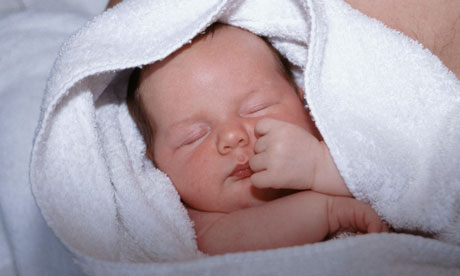
GPs are scaring women out of giving birth at home by wrongly telling them they will come to harm if they do, the leader of Britain's midwives claims.
Some family doctors tell mothers-to-be they risk bleeding dangerously and may find their midwife unable to help, said Cathy Warwick, general secretary of the Royal College of Midwives.
"There are doctors that still tell women scary things that aren't evidence-based that then put them off having a home birth," Warwick told the Guardian. She was referring to GPs and not obstetricians and gynaecologists in hospitals, she said.
"Around the country there are people who feel very strongly that women who are having a home birth are putting their baby at risk. They tell them that if you have a home birth you will have a haemorrhage and the midwife won't be able to do anything about it. I have heard of that being said to women," said Warwick, who added that a small number of midwives said similar things.
"The implication is that you will be safer if you come into hospital, and that's not necessarily true. We know that things can go wrong whether women are at home or in hospital," she added.
GPs who do this are not aware of the latest research about the safety of home deliveries, which means expectant mothers receive wrong information. "It tends to be people who don't have real information about the evidence. Clearly some doctors aren't up-to-date with the evidence about home births, and especially the safety of home births, in the UK," Warwick said.
"I just feel upset that women aren't being given correct information based on the evidence and that that information is potentially skewing women towards giving birth in hospital."
The leader of Britain's 45,000 GPs rejected Warwick's claims. "I would be delighted if there were more home deliveries. In my experience GPs are not scaring women out of a home delivery. I don't recognise that GPs are putting women off from having a home delivery," said Dr Clare Gerada, chairman of the Royal College of GPs.
The issue affecting home births is the NHS's lack of midwives, added Gerada. "Home deliveries are a bit of a luxury given the shortage of midwife resources. They need two midwives for a home delivery, which is a phenomenal use of resources at a time when resources are tight."
Recent NHS figures showed that 2.7% of the 706,248 births in England and Wales last year were at home, down from 2.9% in 2008. Mary Newburn, head of research and information at the parenting charity the National Childbirth Trust (NCT), lamented women's "limited" access to home birth in parts of Britain and said it should be "a mainstream option", along with maternity units for women.
"NCT believes women are finding it more difficult to book a home birth," she said. "There is no evidence of a reduction in demand, but we know maternity services are additionally stretched due to a rising birthrate and too few midwives. Low midwifery staffing levels can mean home birth is either not offered at all, or is withdrawn at short notice.
"For those who have had a straightforward pregnancy and like the idea of a home birth, the advantages include greater privacy and comfort in familiar surroundings, more control, one-to-one midwifery support, and the opportunity for the whole family to stay together after the birth", she added.
Warwick called for "a seismic shift" in maternity services, with more emphasis on midwife-led units. "We feel that there is a concerted and calculated backlash by sectors of the establishment against homebirth and midwife-led care," she said.

